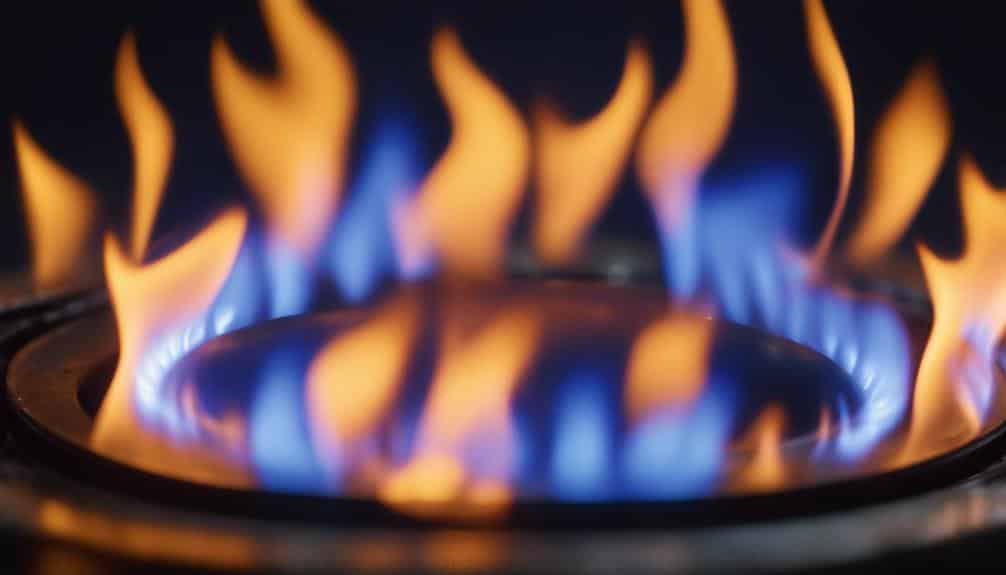In the comparison between LPG and natural gas, LPG, a mixture of propane and butane, contains higher energy content than natural gas. LPG operates at higher temperatures for better efficiency, while natural gas is more cost-effective for consumers due to lower pricing.
LPG boilers produce more heat output at a higher cost. Factors like environmental impact and practical considerations are crucial in decision-making.
Understanding the differences in fuel characteristics, costs, efficiency, and environmental impact is essential for consumers comparing LPG and natural gas.
Table of Contents
ToggleFuel Characteristics and Energy Content

LPG, a blend of propane and butane, has an energy content of about 93MJ/m³, significantly higher than the 39MJ/m³ of natural gas.
LPG boilers operate at higher combustion temperatures, leading to better energy efficiency compared to natural gas systems.
This higher combustion temperature contributes to LPG's superior performance in terms of energy efficiency.
Understanding these differences is crucial for consumers making decisions about fuel options for heating and other uses.
Cost Analysis and Comparison
When comparing the cost implications of LPG and natural gas for consumers, it is important to consider pricing structures and associated expenses. LPG costs approximately 12.2p per kWh, while natural gas costs around 6.77p per kWh for pre-payment customers.
Annual costs for renting LPG storage tanks range from £60 to £150, which increases the overall cost of using LPG. Although the upfront installation costs for LPG and natural gas boilers are similar, the ongoing cost of running LPG boilers is higher.
In terms of cost-effectiveness, natural gas emerges as the more economical choice for consumers due to lower energy consumption and associated expenses.
Efficiency and Performance Comparison

LPG boilers burn hotter than natural gas boilers, resulting in higher heat output. LPG is priced at around 12.2p per kWh, while natural gas costs 6.77p per kWh for pre-payment customers.
Although both types have similar installation costs, LPG boilers are more costly to run due to the higher operational expenses. Consumers should consider the trade-off between the efficiency of LPG and the lower operational costs of natural gas when choosing between the two options.
Practical Considerations and Environmental Impact
Choosing between LPG and natural gas boilers has practical implications for households. LPG boilers are suitable for off-grid homes, requiring storage tanks and deliveries. In contrast, natural gas from the national grid offers simpler logistics.
LPG is more environmentally friendly than natural gas, with higher energy efficiency and cleaner burning. This makes LPG a greener choice, emitting lower emissions and being more efficient. Considering these factors is crucial for informed decision-making aligning with household needs and sustainability goals.
Regulation, Financing, and Additional Information

Regulation and financing of LPG and natural gas products are overseen by the Financial Conduct Authority to ensure consumer protection and fair practices.
Energy efficiency is a crucial factor when choosing between LPG and natural gas, with LPG offering higher efficiency due to its hotter burning capabilities.
Financing options include 4 years 0% APR on selected products, subject to status and affordability.
Understanding the financial aspects and energy efficiency of LPG and natural gas products can help consumers make informed decisions aligned with their needs and budget constraints.
Frequently Asked Questions
Can LPG Boilers Be Converted to Use Natural Gas?
LPG boilers can undergo a professional conversion process to utilize natural gas. Consider factors like fuel efficiency, environmental impact, and cost before proceeding with the conversion. Seeking expert advice ensures a smooth transition and optimal performance.
Are There Subsidies Available for Switching to Lpg?
Government subsidies are available to switch to LPG, promoting reduced emissions and increased efficiency. These subsidies aim to incentivize households to adopt cleaner fuel options like LPG, aligning with sustainability goals.
How Often Should LPG Storage Tanks Be Inspected?
Inspections of LPG storage tanks are essential for safety compliance. Qualified professionals should inspect tanks annually to identify potential issues early, ensuring safe and efficient operation.
Is It Possible to Use Natural Gas in Remote Areas?
Natural gas usage in remote areas relies on available infrastructure. Off-grid solutions may necessitate costly installations. Consider environmental impact, emissions, and accessibility in comparison to LPG. It is advisable to consult local regulations and safety guidelines for feasibility.
Are There Differences in Maintenance Costs Between LPG and Natural Gas Boilers?
Initial installation expenses and energy efficiency are crucial factors when comparing maintenance costs of LPG and natural gas boilers. LPG boilers, although more expensive to operate, offer higher efficiency. On the other hand, natural gas boilers are more accessible and have easier distribution.



